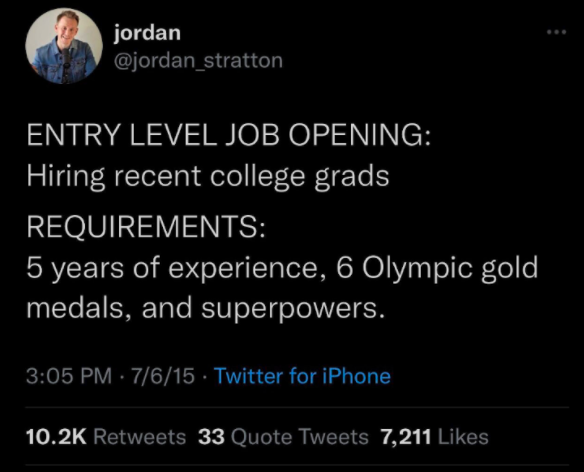What does Entry Level Mean?
Oct 26, 2024
Entry level positions are designed for recent college graduates and are typically meant to require little to no prior experience.
However, many job seekers, especially recent graduates, find that this isn’t always the reality.
In today’s competitive job market, it’s not unusual to see entry level roles on platforms like LinkedIn demanding 3+ years of experience.
This shift has made it increasingly challenging for college graduates to land their first full-time job, as many employers expect candidates to possess multiple internships or relevant professional experience.
The COVID-19 pandemic further complicated this situation, leaving many juniors and seniors without the necessary experience to qualify for entry level positions.
Understanding what does entry level mean and its implications is crucial for new graduates. Let’s delve deeper into the definition and importance of entry level jobs in your career journey.

What does entry level mean on job descriptions?
When searching for jobs with the entry level filter on platforms like LinkedIn or Indeed, you’ll encounter hundreds of potential opportunities.
However, what does entry level mean in this context? Some entry level jobs require no experience at all, while others may demand 3-5 years of experience.
Additionally, the requirements for education can vary widely; some entry level positions require a college degree, while others do not.
Despite these differences in qualifications, it's important to note that salary is often directly linked to the required years of experience.
Typically, jobs seeking applicants with more experience are willing to offer higher pay to match that expertise.
Understanding what does entry level mean can help you navigate your job search more effectively and make informed decisions about which opportunities to pursue.
Climbing the career ladder.
If entry level is the bottom of the career ladder and requires up to five years of experience, how are we ever supposed to start?
Way Up stated in “What is an Entry Level Job” that many entry level positions require no experience at all, so those with a degree are overlooked.
Those with degrees are expected to have the three years of experience needed for a higher position. “Although they may be labeled “entry-level,” they would be better defined as entry- to mid-level jobs, since they expect you to have 1-3 years of full-time, professional experience.”
Way Up clarifies that the smaller companies are the ones who list jobs as entry level, but want more years of experience.
Even if you don't meet the listed required experience on jobs, that doesn't mean you're not the best fit for the role. It's not uncommon for under-qualified applicants to come out on top.

What does entry level mean and why do they want so much experience?
The big question is…what do you do when a job requires two or more years of experience, and you don't have that?
We need experience to get a job, but we need a job to get experience. At Sky Society, we call that the experience paradox and our accelerator was built to solve that for women looking to start careers in marketing.
Did the chicken or the egg come first? Did the job or experience come first? Everybody seems to disagree on the right answer.
For many companies, keeping the role entry level is a way to pay less for more experience.
The Muse has an answer in their “What to do when an Entry - Level Job Requires “Two Years of Experience”. Most of the time the job description is the hiring manager’s wish list of what they are looking for in a potential candidate. It doesn't mean they won't make exceptions for candidates with less experience.
So even if you don't meet the requirements for an entry level job, don't let that deter you from applyin!
We're still searching for our answer.
The truth is that every company and hiring manager defines entry level differently. All you need to do is keep applying to jobs that may not feel fully qualified because job descriptions are often wish lists, not strict requirements.
There are some positions that will hire you with no experience and will train to your full potential.
What does college teach you?
College gives you the credentials, not the experience. We're falsely told that a degree is all we need to enter the job market, but that's not true anymore.
Experience matters more and entry level jobs are demanding it.

Conclusion
What does entry level mean?
There’s no single definition, but entry level jobs serve as crucial starting points for many job seekers.
These roles typically require less experience and education, making them accessible to recent graduates and those new to the workforce.
While the specific job requirements can vary, employers are generally looking to invest in candidates they see potential in—and that candidate could be you!
Don’t let feelings of being under-qualified hold you back; every application is a step forward.
Remember, all it takes is for one company to say yes. Once you secure that first entry level job, you’ll likely find that opportunities will start to multiply.
Although facing rejections can be tough, stay persistent and keep applying. Understanding what does entry level mean can empower you on your journey to success!
Written by Gabrielle Sayer
JOIN 25K MARKETING GIRLIES
Women in Marketing LinkedIn Group
A private community where young women in marketing network, collaborate, and support each other.
GOOD STUFF ONLY
Sky Society Weekly Edit
Signup for our weekly newsletter for:
✨ New entry-level marketing jobs
✨ Marketing tips and tea
✨ Resume and portfolio resources
✨ Invites to exclusive events
We hate SPAM. We will never sell your information, for any reason.









